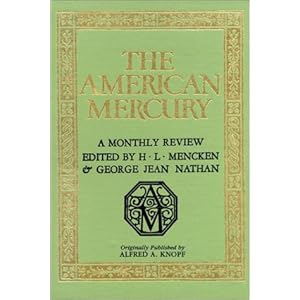Sage Me

After enduring more American self-congratulation, I appreciate why H.L. Mencken was a Tory sniper.
I discovered Mencken through my friend Mark, a NYC stage actor who got a lot of TV/film work in LA. (He played Julia Louis-Dreyfus' boyfriend in Soul Man.) Mark's politics seemed libertarian, though he was skeptical of all faiths. He said I had the demeanor of "a cynical ex-communist," so reading the Sage of Baltimore might balance me out. He handed me his copy of The Mencken Chrestomathy, put a McKinney's Cotton Pickers 78 on his wind-up Victrola, sipped a beer and laughed.
At this point my political reading largely consisted of Hitchens and Cockburn in The Nation; Chomsky, whom I'd also just discovered; National Review editorials; literature from the Central American and South African solidarity movements; Maximum Rock and Roll, which kept the anarcho-punk vibe alive. Digging into Mencken gave me the weirdest kick yet.
He didn't seem to belong anywhere. He bashed capitalists, communists, socialists, reformers, farmers, tycoons, celebrities, Democrats and Republicans -- pretty much the American spectrum. His prose was archaic and electric. At times his critiques were so blistering that you imagined he was a sad and bitter man. Yet he appeared to be having fun.
Mencken made a serious impression on me. I spent months in the New York Public Library on 40th Street poring through bound back issues of The American Mercury, the monthly co-edited by Mencken and theater critic George Jean Nathan. The Mercury was early gonzo. During its heyday in the 1920s, the Mercury was celebrated, reviled, even prosecuted. In 1926, Boston banned the Mercury for obscenity, which inspired Mencken to visit Beantown where he was promptly arrested for selling a copy. It didn't stick. Mencken was released the next day, all charges dropped.
Not everything Mencken wrote jazzed me. I hated his characterizations of Baltimore's Black population, even though he embraced and promoted Harlem Renaissance writers. I don't recall him writing all that much on Jewish issues, though later he was accused of anti-Semitism, which may or may not have been true. (His closest friend was Alfred A. Knopf, but still.) Mencken despised nationalist organizations, singling out the Ku Klux Klan for special abuse. His scathing obituary of William Jennings Bryan influenced Hunter S. Thompson's attacks on Richard Nixon. Mencken was intelligent, rancorous, poetic. He was also an elitist who believed in natural hierarchies.
Underlying much of his commentary was a deep contempt for the general American population. Americans, by and large, were idiotic, ill-mannered, credulous, superstitious, petty, vain. They stomped on those below them and groveled before those above them. Americans were a mob of boobs, easily fooled by demagogues. At the time this disturbed me. I was also reading anarchist history and theory, the whole basis of which depended on the humanity and intelligence of average people. If the majority of Americans even remotely resembled Mencken's caricatures, then we were fucked. Bright-eyed mid-20s me didn't want to hear that.
While older me retains some faith in common intelligence and solidarity, it's not going to emerge in the United States. Not anytime soon. Reactionaries are crazy. Liberals cynical and craven. Radicals severely marginalized, scattered. Corporations run the show, bleeding us dry while fattening the One Percent. War is enshrined as a national virtue. Political ignorance and obedience are rewarded. Historical amnesia is at record levels.
Nobody seems to know what to do. So we drift along, finding glory in vengeance, believing what our owners say no matter how many times they change the official story. Chomsky claims that this is fertile ground for political organizing. Yeah, well, we'll see. Conditions are extremely different from the good old days of activism and agitation.
I'm sure that Mencken would have enjoyed the bin Laden circus. Favoring the death penalty, he'd have little problem with Osama's execution. Hating most religion, he'd doubtless rip apart Islam, though it would be better written than present-day Muslim bashing. Hating chanting mobs, he'd revel in coarse American self-righteousness as proof of his philosphy. Mencken would review it all with a knowing smile. Or maybe he'd be appalled by the current show and return to his grave. There's only so much a contrarian can take in life. Death must make it even more grating.


<< Home